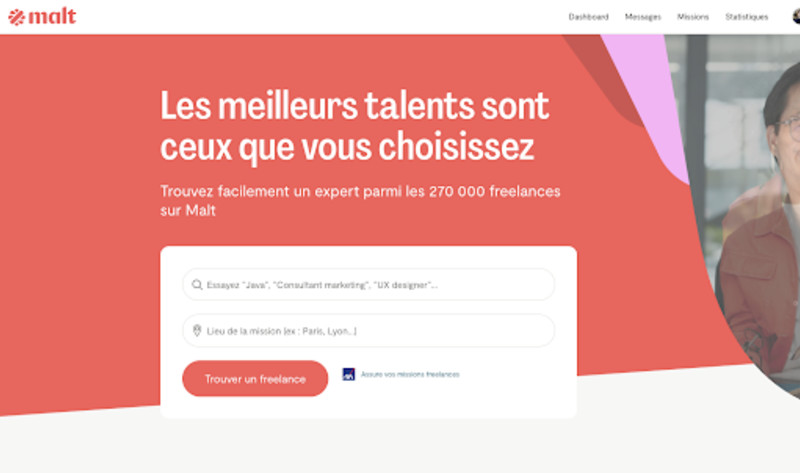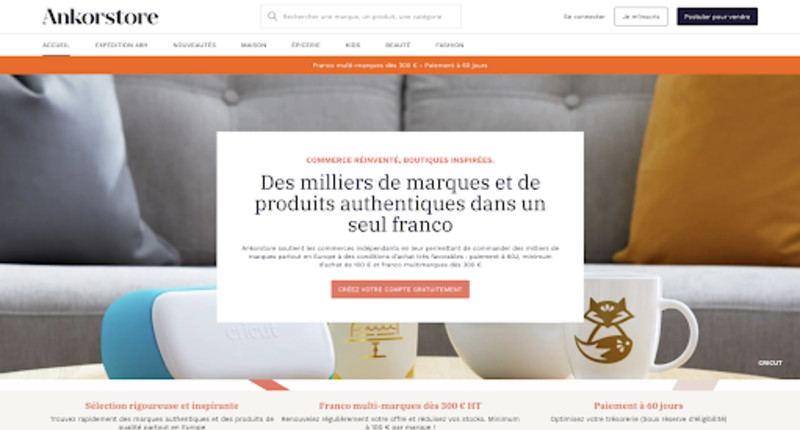5 French Startups Helping Independent Workers and Small Businesses
Table of contents
At the end of 2019, independent workers represented 12% of the French population, or 3.6 million people -- one million more than in 2009. And it seems in 2020, the pandemic accelerated the trend with half a million new self-employed individuals creating their legal structure. More specifically, today freelancers account for more than 1 million individuals in France, as a recent study by BCG and freelance platform startup Malt shows.

At the end of 2019, independent workers represented 12% of the French population, or 3.6 million people -- one million more than in 2009. And it seems in 2020, the pandemic accelerated the trend with half a million new self-employed individuals creating their legal structure. More specifically, today freelancers account for more than 1 million individuals in France, as a recent study by BCG and freelance platform startup Malt shows.
With mandatory store closures hitting many non-essential businesses, coupled with partial unemployment measures and international and national logistics slowdowns, antiquated tools and processes used by SMEs and independent workers have shown their limits in 2020.
Small businesses need more control and visibility over their finances and operations if they want to survive the unpredictable ups and downs of the pandemic. Over the past few years, a cohort of new startups has emerged in France targeting self-employed people and SMEs with sleek platforms and tools in recruiting, invoicing, sourcing, and more. Some of them have shown exceptional growth and appetite from investors in 2020, hinting that time has finally come to digitize pen and paper for this class of workers.
The Org has identified five promising scale-up startups from France that have prospered throughout the pandemic by helping small businesses and independent workers better manage their businesses.
Indy: the smart accounting assistant for self-employed workers
Indy, formerly known as Georges, was founded in 2016 by CEO Côme Fouques, CTO Romain Koenig, CMO Adrien Plat and co-founder Pablo Larvor in Lyon to help independent workers better manage their accounting. On Indy's platform, lawyers, doctors, freelancers, architects, and any self-employed person can get their accounting done without doing any manual entry -- simply by connecting their bank account. At the core of the product, machine learning is used to treat, classify and label every expenditure.

For those workers who still use Excel or pen and paper to do their accounting, Indy comes as a smart and reliable assistant offering not only more transparency, but also more control with users able to see their corporate revenue at a glimpse, as well as track expenses. Indy's robot can also fill tax records automatically through a one-click teletransmission or help with VAT by processing receipts and invoices to calculate the amount a merchant is supposed to pay back.
To access Indy's platform, customers pay a monthly subscription of 20€ ($23.5) or 49€ ($57.8) per month depending on the tier of platform and support features. And the product seems to be worth the price with 70% of users subscribing after undertaking a free trial.
In January 2021, the startup counted 40,000 clients after reaching 1,000 clients in 2018 and more than 10,000 in 2019.
To fund its rapid growth, the team raised a 35M€ ($43.4M) Series B funding in early 2020 with Singular, Alven and Kerala Ventures. The startup currently employs a hundred people and aims at expanding its target market by seducing craftspeople who have a particular tax regime, as well as entering the U.S. market by the end of 2021.
Malt: the go-to destination for paid freelance projects
Freelance platform Malt is a thriving 8-year-old startup that landed one of the largest funding rounds in France this year with a whooping 80M€ ($94.4M) Series B investment from private investors Goldman Sachs, Eurozeo, ISAI and Serena.

The opportunity is ripe, with the global market for freelance platforms forecasted to reach $9.19B by 2026, up from $3.39B in 2019. As of today, the startup has convinced more than 250,000 freelancers to get on its platform to find freelance projects. With another 8,000 new users joining every month from France, Spain and Germany, Malt's growth seems unstoppable.
Counting more than 40,000 business customers on the other side, Malt has also proven that startups and SMEs -- but also big corporations -- are fond of working with freelancers on temporary projects. According to the startup, 80% of the companies from the CAC40 are using their platform.
To better match freelancers with clients' needs, the team has developed AI solutions over the years to offer relevant profiles. The product also smoothes the relationship between both parties by hosting the invoice and payment process. That's where Malt gets its revenues: the startup charges a 5 to 10% fee per invoice, and the more a freelancer works with a client the more this fee goes down. In 2021, the startup announced it had reached 200M€ ($236M) in business volume transiting through its platform and that it hopes to reach 1B€ ($1.2B) by the end of 2024.
Iziwork: the AI-powered marketplace for temporary work
CEO Alexandre Dardy and co-founder Mehdi Tahri launched Iziwork in 2018 as a marketplace for temporary work. With its mobile app, candidates can easily access and apply to hundreds of gig offers across several industries such as hospitality, construction, logistics, or distribution.

In 2019, nine job seekers out of 10 have done research online while less than one temporary gig out of 10 is filled online according to Pôle Emploi, the French governmental agency in charge of unemployment. The temporary work market has remained archaic and still relies on a network of brick-and-mortar agencies using papers and pens to fill vacancies. Iziwork's intuitive and sleek platform is now changing this status quo: with 95% of the gigs assigned in less than 4 hours, the startup is proving that its AI is a powerful matcher.
When candidates apply -- whether they're plumbers, warehouse managers, drivers, or receptionists -- resumes are scanned by Iziwork's AI not only to suggest relevant offers but also to use previous applications from similar candidates as data points to share the likelihood of a candidate's hiring. Clients, on the other hand, can manage their offers through the web platform, run the hiring process as well as keep track of their currently employed temporary workers.
In just three years, the startup has attracted 2,000 client companies such as Casino, Fnac-Darty and PSA, onboarded 800,000 candidates in France and Italy, raised 51.5M€ ($60.75) in funding and recruited 120 collaborators. By the end of 2020, the company announced a 300% yearly growth and 250 jobs to fill.
Libeo: the reliable invoice assistant for SMEs
In France, SMEs are still known for being late to digitize their operations. It's especially true when it comes to invoicing. While around 35 billion invoices are generated across Europe every year, 77% of SMEs are not using any digital tool for managing or paying them; a majority still prints out invoices and pay through bank transfers or checks.
Libeo intends to dust off the process by simplifying tedious and time-consuming tasks: on its online platform, businesses can now benefit from automated invoice collection, team approval options, and one-click payment. The goal is to avoid regular data entry errors by minimizing the input needed from users. On top of that, Libeo's users can access a real-time view of their finances and cash flow, something critical to SMEs.

Libeo's co-founders CEO Pierre Dutaret, CPO/CTO Pierre-Antoine Glandier, COO Jeremy Attuil aimed right: two months after its initial launch in 2019, some 12,000 invoices for a total amount of 1M€ ($1.2M) had already been treated on the platform, and four months after its launch the company had gathered over 5,000 clients. Last year, the company reached 2M€ ($2.4M) in payments made on its platform and raised 4M€ ($4.7M) in funding from LocalGlobe and previous investor Breega.
Ankorstore: the curated marketplace for independent retail stores
Ankorstore wants to be the marketplace destination for all local retailers looking for products from independent brands to fill their shelves. Started in 2019 by former Etsy executives and serial entrepreneurs Nicolas Cohen, Nicolas D’Audiffret, Mathieu Alengrin and Pierre-Louis Lacoste the business has attracted more than 5,000 brands and 50,000 independent retailers across Europe.
Ankorstore makes it easy for local stores to access brands by offering advantageous order and payment conditions: 60-day payment terms, minimum purchase orders of 100€ ($118) per brand, and one consolidated order for multiple brands. Its curated marketplace also facilitates the scouting of new brands for retailers looking to attract or retain customers and remain competitive with e-commerce giants such as Amazon. On the brands' side, companies can tap into an international network of local shops as well as enjoy direct contact and returns with retailers, as well as payment upon delivery.

Even though many of Ankorstore's targeted clients, labeled as non-essential by the French government, had to close their stores for long periods during lockdowns, the startup has managed to thrive against all odds: its business has tripled in the first four months of 2021.
The team announced last May it had raised a Series B funding of $100M from Tiger Global and Bain Capital Ventures among others to fuel its growth and consolidate its presence in the U.K., Germany, The Netherlands and Sweden. It had previously raised 25M€ ($29.5M) in Series A funding in December 2020.
--
The Org is a professional community where transparent companies can show off their team to the world. Join your company here to add yourself to the org chart!





